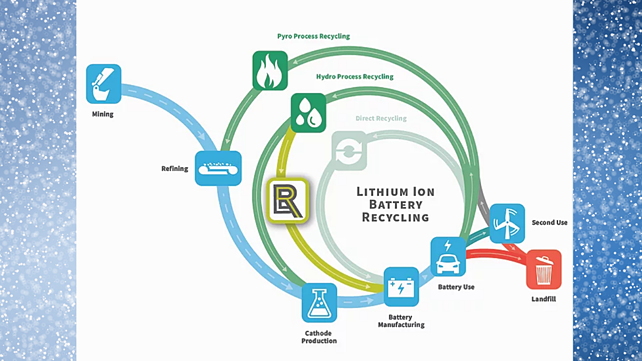
Battery Resourcers has announced that the completion of a $20 million Series B equity round will support the development of a commercial-scale processing facility with the annual capacity to process 10,000 tons of batteries — or the batteries from approximately 20,000 electric vehicles (EVs) a year.
The vertically integrated lithium-ion battery recycling and manufacturing company received the funding led by Orbia Ventures, the venture capital arm of the multinational Orbia, and other investors, including At One Ventures, TDK, TRUMPF Venture, Doral Energy-Tech Ventures andJaguar Land Rover's InMotion Ventures.
Unlike other battery recycling companies, Battery Resourcers offers a fundamentally new approach to lithium-ion battery manufacturing, starting with a mixed stream of used lithium-ion batteries and ending with the production of finished, battery-ready active cathode materials.
With 97% metal recovery, the company can produce Nickel Manganese Cobalt (NMC)-based active cathode materials with 35% reduction in cost, 32% reduction in emissions, and 13% reduction in energy consumption compared to the production of virgin cathode.
The company is also engineering a novel process for graphite recovery and purification, which will enable it to return both the cathode and anode active materials back to manufacturers of new batteries.
Mike O'Kronley, CEO, Battery Resourcers, said, 'Being able to convert scrap and end-of-life battery materials into finished, cathode active material that can be directly used in making new batteries drives increased profitability and stability for the lithium-ion battery ecosystem. Our investment partners share our vision and passion for scaling this revolutionary process to support the battery material supply chain.'
The company is also helping the EV industry address several complex environmental and regulatory issues. As lithium-ion batteries are discarded during manufacturing or reach their end of life, finding new ways to recycle and reuse materials will reduce reliance on mined metals, which pose significant environmental and social challenges. Additionally, millions of EVs will hit the road in the coming years, and new regulations mandate recycling of spent batteries and use of recycled metals in new batteries.
Sameer Bharadwaj, CEO of Orbia said, 'The recycling of critical battery components into cathode active material is a value leap in getting to sustainable and scalable production of lithium-ion batteries. By integrating refinement and materials engineering processes, we believe Battery Resourcers' approach can stabilise the cathode supply chain in North America while accelerating the shift to a clean, circular future – a goal we are very much invested in at Orbia as we seek to generate innovative solutions that advance life around the world.'
NB: Photo is representational.